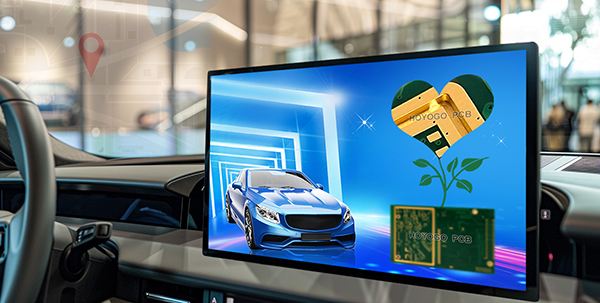With the widespread adoption of electronic devices such as smartphones and tablets, user demand for automotive intelligence continues to grow. The intelligent cockpit has become a key direction in automotive development. The intelligent cockpit PCB plays a crucial role in automotive electronic systems, integrating multiple functions, including infotainment, driver assistance, and vehicle connectivity through HMI (Human-Machine Interface) technology. This provides drivers and passengers with a more convenient, safe, and comfortable experience.

Core Functions of Intelligent Cockpit PCBs
The core technology of an intelligent cockpit relies on intelligent cockpit PCBs to accommodate various electronic components while enabling signal transmission and data processing. As an essential part of automotive PCBs, intelligent cockpit PCBs are primarily used in the following applications:
1) Central Control Display: Traditional physical buttons in car dashboards have evolved into LCD touchscreens, requiring high-density interconnect (HDI) intelligent cockpit PCBs to support complex signal processing and high-speed data transmission.
2) Digital Instrument Cluster: Replacing traditional mechanical gauges, digital instrument clusters use TFT LCD or OLED screens, demanding PCBs with higher integration and signal integrity.
3) Head-Up Display (HUD) System: HUD technology projects critical driving information onto the windshield, reducing the need for drivers to shift their gaze. Intelligent cockpit PCBs must support high-performance signal processing and optical projection technology to ensure stable and clear visuals.
4) Multi-screen Interactive System: With the trend toward multi-screen intelligent cockpits, PCBs must enable data synchronization across multiple displays, requiring superior signal integrity and anti-interference capabilities-making high-quality automotive PCBs essential.
5) Voice Recognition & Gesture Control: The integration of AI allows intelligent cockpits to be controlled through voice and gestures. These functions require high-performance computing units, and the PCBs must support high-speed signal transmission to ensure precise command execution.
Technical Requirements for Intelligent Cockpit PCBs
Due to the high-frequency, high-speed signal processing, large power loads, and multilayer integration involved in intelligent cockpits, their PCBs must meet the following technical requirements.
1) High-Density Interconnect (HDI) Design: Increases wiring density, reduces signal interference, and optimizes space utilization, making PCBs more suitable for compact designs.
2) Multi-layer PCB Structure: Supports complex circuit layouts, enhances signal integrity, and improves anti-interference capabilities, making it one of the important standards for high-performance automotive PCB manufacturing.
3) Low Dielectric Loss Materials: The use of low Dk/Df (dielectric constant/loss factor) materials improves high-speed signal transmission efficiency, ensuring PCB stability in high-frequency environments.
4) High-Temperature & High-Reliability Design: Since intelligent cockpits operate long-term in high-temperature conditions, PCBs must have excellent thermal management, using high-temperature-resistant materials such as FR-4 and ceramic substrates to enhance durability and safety.
5) Flexible PCB (FPC) Applications: In compact devices like curved displays and onboard cameras, flexible PCBs offer greater design flexibility, allowing automotive PCBs to adapt to complex installation environments.
HoYoGo is an international, professional and reliable automotive PCB manufacturer. With highly automated and dedicated automotive PCB production lines, our automotive PCB products account for 49% of our total production. Our production strictly adheres to high-quality standards, with certifications including ISO 9001, ISO 14001, ISO 13485, and IATF 16949. All products comply with IPC-A-600-H and IPC-6012 acceptance criteria, ensuring exceptional quality and stability for intelligent cockpit PCBs. If you have related PCB needs, welcome to send us your inquiries.